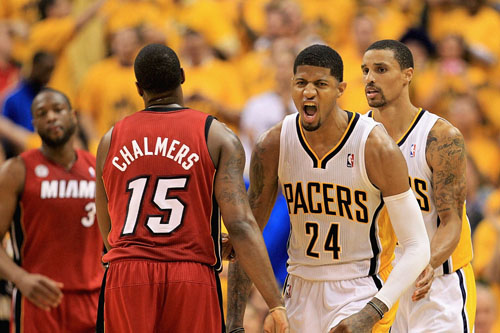
I grew up in what most people would consider a small media market. As of September 2012, my hometown of Indianapolis was ranked 26th in the country in the number of households with a television. In all sports, but especially in professional basketball, this is said to be a very important aspect of a franchise’s ability to position itself as a consistent winner.
The other three teams remaining in the NBA playoffs were ranked 16th (Heat), 36th (Spurs) and 49th (Memphis). The reality is that you can win in a small market.
But the public perception is vastly different, and it’s based on a misconception about what “small” really means. Indianapolis is not a small city by any objective definition; the Indy metro area population was around 1.75 million during the 2009–10 NBA season, when Forbes deemed the Pacers “among the most troubled franchises in the NBA.” Perhaps they are troubled relative to a franchise like the Los Angeles Lakers, which just this year signed a $3.6 billion television contract with Time Warner Cable. But it’s something of a stretch to term a franchise “troubled” when you’re talking about a team that was purchased for $11 million in 1983 and is now worth $383 million (and rising).
Nice little ROI, particularly considering that team owner Herb Simon already has a net worth of roughly $2.2 billion.
I bring this up to demonstrate that, in terms of pure financial viability, there really is no such thing as a small market for owners of professional sports organizations. It’s a concept that was invented by a group of billionaires so they could put the screws to players in collective bargaining agreements—a way to wring a bigger profit share from their larger-market co-conspirators and coerce taxpayers into footing the bill for new arenas. It’s a pretty slick racket, one that relies on convincing customers that a metro area of nearly two million people is somehow “small.”
Don’t get me wrong—this isn’t a rant against the wealthy. This is about the toll that being a so-called small market has on the civic pride and psychological well-being of a city’s population. When you grow up in a town like Indy and you watch sports, awareness of your city’s place in the pecking order seeps into your consciousness from an extremely young age. You see it in the amount of respect your opponents show you, in the officiating, in the national reporting of your team’s games. It’s a subtle but constant drumming that goes like this: “You’re a small city, so you are less culturally significant, which means you aren’t as smart, which means you’re not as important.”
That drumbeat has only gotten louder in the age of 24-hour media coverage. Now, when the Pacers whip the New York Knicks in the playoffs because by every conceivable definition, Indiana is a better team, you hear round-the-clock analysis of “what went wrong with the Knicks.” After New York lost their series—lost!—there were four days of discussions about what the next step for the franchise might be. (My suggestion is to try not being so irrelevant from a basketball standpoint.) Meanwhile, the team that beat them soundly and was preparing to continue their season in the next round received no attention. That kind of treatment has persisted throughout the conference finals. Zach Lowe of Grantland is one of the only writers who has gone out of his way to recognize the excellence of the Pacers—to tell the whole story—and it’s part of the reason that he is currently the best basketball writer in the world.
People in Indianapolis hear this stuff, and it gets to them. It wears on their self-esteem in tiny ways every day. And you can say it’s “just sports,” but that’s like saying it’s “just” art or literature or politics or religion. That’s not hyperbole or false equivalencies; all of those institutions demand and are enriched by our faith, and they in turn enrich us. A rational, emotionally healthy adult might argue that sports shouldn’t be allowed to define any aspect of our self-worth, but they do, and there is absolutely nothing wrong with that. Competition, a sense of community and shared experience, civic pride—that’s what sports are about, and I always feel sorry for people who can’t figure out a way to love something about them. Life is just better when you love sports. I believe that.
And yet in cities like Indianapolis, this passion for sports is being undermined. Not through exploitation at the ticket window or on tax day or when a greedy billionaire claims he “needs” a new arena, but when Indiana beats New York and Hoosiers are made to feel like it’s the other way around—as though winning, the ultimate measure of value in sports, doesn’t really matter at all.

